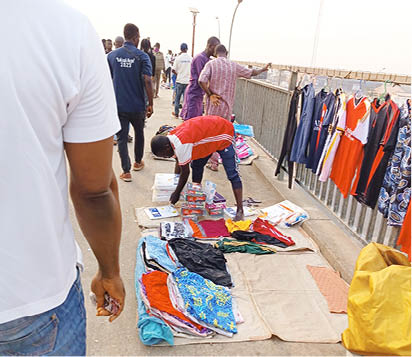Dei-Dei community in the Federal Capital Territory (FCT) is known for booming commercial activities, especially with its International Building Materials Market and other commercial entities, Daily Trust Saturday reports.
Located off the Kubwa-Zuba expressway, under the Abuja Municipal Area Council (AMAC), slums or ghettos are also located on the other side of the satellite town.
The slum areas include Agwan Fulani, Fillin Dabo, Saburi, Pazzari, Jiwa, Shagari Quarters, Bagusa, and a host of other small settlements.
It is generally believed that one cannot build a house in the country’s capital without a visit to the building materials market, which is divided into sections.
- Consider Gwagwa- Karimo- Dei-Dei road project done – Wike
- Oronsaye Report: FG must tread with caution
Our reporter who recently visited Dei-Dei observed that like many other commercial centres in the country, the pedestrian bridge at the junction leading to the community has since been converted into trading zones, as many traders – men, women and children—besiege them, mostly in the evenings and spread their wares for sale.
Items such as clothes, shoes, jewellery, perfumes, household appliances, food items, among others, are displayed on the bridges for passersby to buy.
Some residents described the pedestrian bridge as “market square.” Traders struggle for space to display their wares, not discouraged by the scorching sun. No spot is designated to any trader as each of them occupies any available space as they arrive.
The passageway is partitioned into two— while one side is left for pedestrians, the other is occupied by traders. This, according to residents, causes congestion and even discourages some of them from using the bridge.
The traders’ wares are relatively cheaper when compared to the prices of the items in the shops. This, they said, was due to the fact that they were not charged for the space they occupy to display their wares, and it is really attracting a lot of customers, who patronise them while using the bridges.
“People come from far and near to buy our goods because we sell at a cheaper rate,” said Abdullahi Ahmed, who sells t-shirts on the pedestrian bridge.
From Dei-Dei junction to the building materials market, where majority of the traders are Igbo, this reporter was advised against boarding a motorcycle due to the narrow nature of the road.
“Come make we enter Keke together, I de go my shop. The road too de narrow and risky for okada,” Kingsley Ikechukwu, a building material trader at the market, who has been in the business for 14 years said in pidgin English.
Ikechukwu, who trades in tiles and doors, said it was no longer business as usual as people were no longer building houses because of the high cost of materials.
He blamed the cost of these materials that one could hardly afford on the high rate of dollars
“It is no longer business as usual for us due to the current economic hardship. You can move around and ask. An average Nigerian struggles with the high standard of living and cannot afford money to build a house.
“The number of people building houses has reduced and this has affected the business because of the low purchase rate of these materials,” he said.
Daily Trust Saturday reports that at Dei-Dei, traders and roadside food vendors, however, smile daily to the banks. To them, the chaotic daily experience in the community is a blessing in disguise.
Our correspondent also visited the Dei-Dei tomatoes market. It was crowded and filled with trucks and vehicles loaded with tomatoes, pepper and onions. Traders said the pricing was fairer when compared to prices of items sold in other markets.
Daily Trust Saturday toured the ghetto areas and discovered forgotten communities, as social amenities are barely in existence.
According to Wikipedia, slums highly populate urban residential areas, consisting of densely packed housing units of weak build quality and often associated with poverty.
Dense population and lack of infrastructure, poor sanitation and poverty indices were their common challenges when this reporter visited some slum areas at Dei-Dei, which include a section of Agwan Fulani, Fillin Dabo, Saburi, Pazzari, Jiwa, Shagari Quarters, Bagusa.
Aside that, the level of school dropouts in Dei-Dei slummy areas is alarming as many take to touting, robbery, bus conducting, carwash and all manners of menial jobs.
While few of the inhabitants are calling for gentrification and remodelling for urbanisation and development, many are trying to cope with the odds.
A resident of Agwan Fulani, Aminu Adris, told our reporter that child and maternal mortalities were some of the major problems affecting the residents due to lack of health facilities.
He said, “As you can see, this area is highly populated. We do not have roads, drainage systems and potable water. We also don’t have health facilities. I have been living in this area for about 10 years and I know how women suffer and die because of lack of health facilities.
“More should be done on providing adequate health facilities in the area, as well as roads, potable water and a good drainage system to ensure a safe and healthy living environment.”
Another resident who doesn’t want his name published due to fear of victimisation said, “It is worrisome to raise a child in such areas with abject poverty and environmental risks. I appeal to the government to evacuate all the inhabitants to another area, reconstruct and remodel the slums to fit the current urban architectural layout.”

 Join Daily Trust WhatsApp Community For Quick Access To News and Happenings Around You.
Join Daily Trust WhatsApp Community For Quick Access To News and Happenings Around You.


